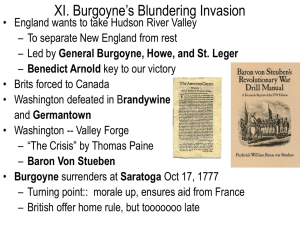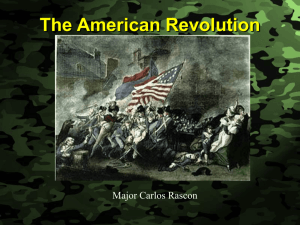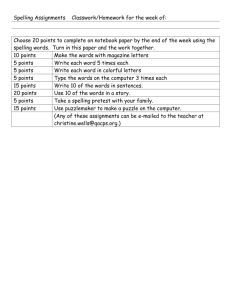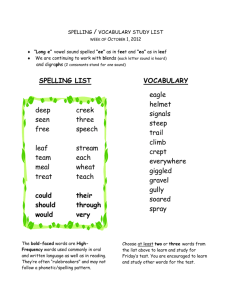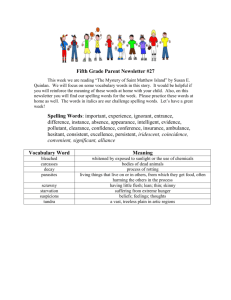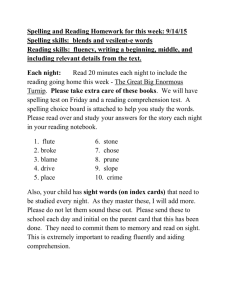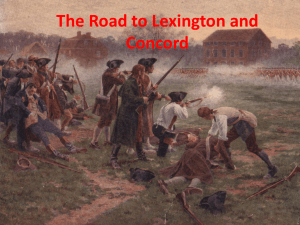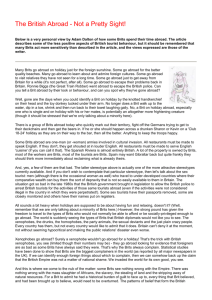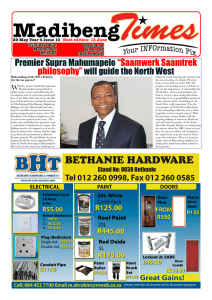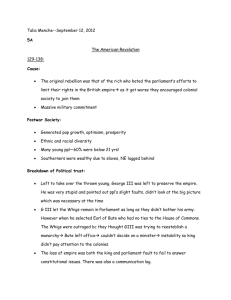Divided by a common Language
advertisement
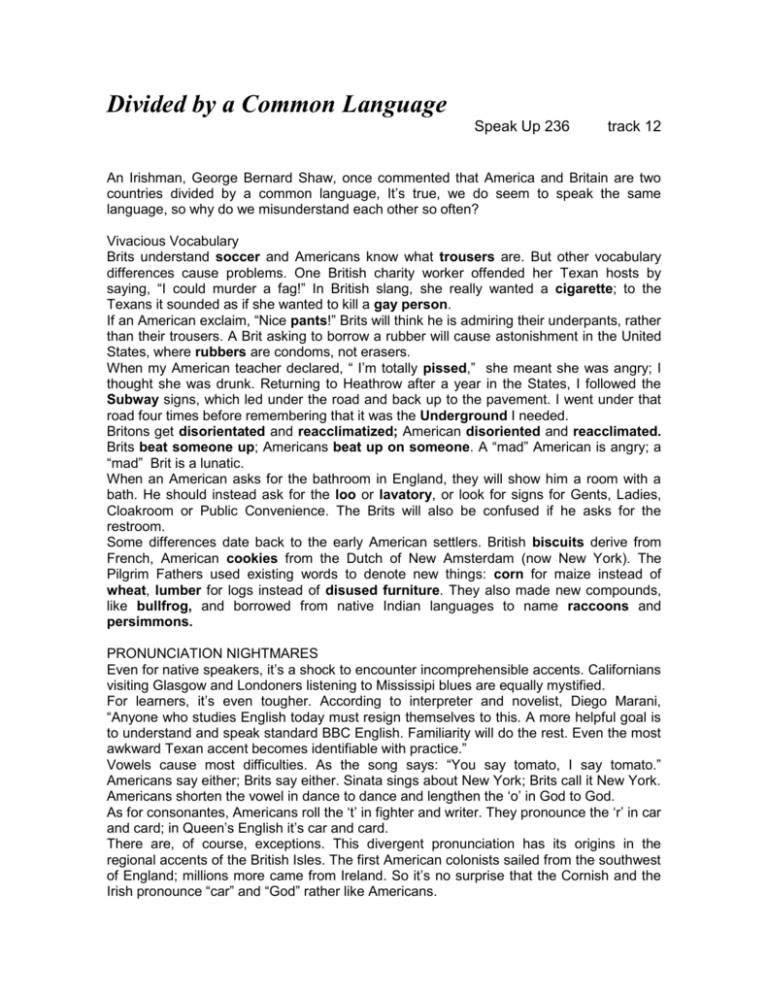
Divided by a Common Language Speak Up 236 track 12 An Irishman, George Bernard Shaw, once commented that America and Britain are two countries divided by a common language, It’s true, we do seem to speak the same language, so why do we misunderstand each other so often? Vivacious Vocabulary Brits understand soccer and Americans know what trousers are. But other vocabulary differences cause problems. One British charity worker offended her Texan hosts by saying, “I could murder a fag!” In British slang, she really wanted a cigarette; to the Texans it sounded as if she wanted to kill a gay person. If an American exclaim, “Nice pants!” Brits will think he is admiring their underpants, rather than their trousers. A Brit asking to borrow a rubber will cause astonishment in the United States, where rubbers are condoms, not erasers. When my American teacher declared, “ I’m totally pissed,” she meant she was angry; I thought she was drunk. Returning to Heathrow after a year in the States, I followed the Subway signs, which led under the road and back up to the pavement. I went under that road four times before remembering that it was the Underground I needed. Britons get disorientated and reacclimatized; American disoriented and reacclimated. Brits beat someone up; Americans beat up on someone. A “mad” American is angry; a “mad” Brit is a lunatic. When an American asks for the bathroom in England, they will show him a room with a bath. He should instead ask for the loo or lavatory, or look for signs for Gents, Ladies, Cloakroom or Public Convenience. The Brits will also be confused if he asks for the restroom. Some differences date back to the early American settlers. British biscuits derive from French, American cookies from the Dutch of New Amsterdam (now New York). The Pilgrim Fathers used existing words to denote new things: corn for maize instead of wheat, lumber for logs instead of disused furniture. They also made new compounds, like bullfrog, and borrowed from native Indian languages to name raccoons and persimmons. PRONUNCIATION NIGHTMARES Even for native speakers, it’s a shock to encounter incomprehensible accents. Californians visiting Glasgow and Londoners listening to Mississipi blues are equally mystified. For learners, it’s even tougher. According to interpreter and novelist, Diego Marani, “Anyone who studies English today must resign themselves to this. A more helpful goal is to understand and speak standard BBC English. Familiarity will do the rest. Even the most awkward Texan accent becomes identifiable with practice.” Vowels cause most difficulties. As the song says: “You say tomato, I say tomato.” Americans say either; Brits say either. Sinata sings about New York; Brits call it New York. Americans shorten the vowel in dance to dance and lengthen the ‘o’ in God to God. As for consonantes, Americans roll the ‘t’ in fighter and writer. They pronounce the ‘r’ in car and card; in Queen’s English it’s car and card. There are, of course, exceptions. This divergent pronunciation has its origins in the regional accents of the British Isles. The first American colonists sailed from the southwest of England; millions more came from Ireland. So it’s no surprise that the Cornish and the Irish pronounce “car” and “God” rather like Americans. Stress often changes, especially in words with foreign origins. Brits say garage, ballet and café, while Americans insist on garage, ballet and café. Some words change spelling and pronunciation. British defence becomes defense; aluminium becomes aluminum. SPELLING REFORM Most people imagine these spelling differences developed over the centuries. Wrong. American spelling derives almost entirely from Noah Webster’s 1828 dictionary. A vigorous reformer, Webster wanted to bring spelling closer to Latin and to spoken English. He took the “u” out of colour, odour and honour. He moved the ‘r’ in centre and metre. He took the ‘e’ out of judg(e)ment, simplified jewellery to jewelry and removed an ‘l’ from wol(l)en, cancel(l)ed and travel(l)ing. He changed cheque to check, gaol to jail and sulphur to sulfur. And he substituted ‘z’ for ‘s’ in words like realize, standardized and civilization. GRAMMAR GAP There are innumerable differences of idiom. At American junctions you must YIELD; on British roads you GIVE WAY. In the New York subway, they warn you to watch your step; on the London Tube, to mind the gap. The British study the American War of Independence; in the U.S. it’s celebrated as the Revolutionary War. The terms Liberal, Conservative and Republican have such complex meanings in both countries you need a history degree in order to understand them. Consequently, native speakers who work “both sides of the herring pond” – or “pond,” i.e. on either side of the Atlantic – have to be flexible, sensitive to their audience, and ready to learn. English, as we’ve seen again and again, has no indisputable dictionary or authoritative academy. A British lexicographer Ernest Gowers considered British usage definitive, as English originated there. American journalist, H.L.Mencken, disagreed: “When two-thirds of the people who use a language call it a freight train instead of a goods train, they are ‘right’; the first is correct usage and the second a dialect.” So we remain divided by our common language. American editions of Harry Potter had to change football to soccer and video recorder to VCR. Meanwhile Scottish band Franz Ferdinand couldn’t communicate in California, as this brief dialog(ue) shows: Drummer Paul Thomson: Los Angeles waitress: Thomson: Waitress: Thomson: (sighs) “Can I have the bill, please?” “What?” “Can I pay?” “You want a canapé?” “OK, a canapé and the bill.” Write the meaning of: beat someone up _________________________________________________________ Brits ____________________________________________________________________ wheat __________________________________________________________________ lumber __________________________________________________________________ persimmon ______________________________________________________________ freight train ______________________________________________________________ loo _____________________________________________________________________ racoon __________________________________________________________________ jail _____________________________________________________________________ jewelry __________________________________________________________________
